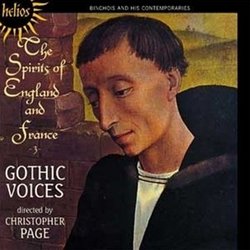| All Artists: Gothic Voices, Christopher Page Title: Spirits of England & France, Vol. 3 Members Wishing: 0 Total Copies: 0 Label: Hyperion Release Date: 9/8/2009 Album Type: Import Genres: Pop, Classical Styles: Vocal Pop, Opera & Classical Vocal, Historical Periods, Early Music Number of Discs: 1 SwapaCD Credits: 1 UPC: 034571152837 |
Search - Gothic Voices, Christopher Page :: Spirits of England & France, Vol. 3
 | Gothic Voices, Christopher Page Spirits of England & France, Vol. 3 Genres: Pop, Classical |
Larger Image |
CD Details |
CD ReviewsMy End is My Beginning, and My Beginning My End Giordano Bruno | Wherever I am, I am. | 02/10/2010 (5 out of 5 stars) "That's a translation of part of the text of a ballade by Guillaume Machaut (1300-1377), in which the three vocal lines are sung forwards and backwards in contrary motion to each other. That ballade is not included on this CD, but the Machaut piece "Il m'est avis" is just as beautifully hyper-rational while sounding almost improvised and wild. A century later, Gilles Binchois (1400-1460) was still writing in the "subtle art" style pioneered by Machaut; in fact Binchois took the style, with its bafflingly complex rhythmic conjuring, farther than anyone. One could argue that Binchois was the culmination of the Medieval in music, the apotheosis of subtlety, and yet he was also clearly the prime influence on the musical thought of Johannes Ockeghem, whom one could identify as the founder of the new wave of polyphony, the "Franco-Flemish" school that supplanted the "Burgundian" of Binchois and Dufay.
Six of the 18 tracks on this CD are devoted to works in French and Latin by Binchois. They are, in my well-known humble opinion, the best-sung and most persuasive performances of Binchois ever yet recorded... better even than the Binchois performances by The Binchois Consort! The other tracks include quite fine pieces by contemporaries of Binchois from both France and England; two of the English composers are relatively familiar - John Dunstable and Leonel Power - but most of these tracks are unique, possibly not sung artfully since the 15th C. There are no tracks devoted to Guillaume Dufay, and that's significant. Binchois and Dufay were exact contemporaries, probably both born in 1400, but Dufay represented (unknowingly, of course) the direction polyphony would take, toward Obrecht and Josquin. Binchois is such a wonderful anomaly, a radical experimenter in musical textures and surface complexities, yet firmly fixed in the "fixed forms" he'd inherited from the 14th C. His end was truly his beginning. The singing on this CD is so close to perfect that, even if the music perplexes you, you'll have to appreciate the artistry. The nine singers include such famous soloists and choristers as Paul Agnew, Rogers Covey-Crump, Catherine King, and Margaret Philpot. All the singing is one-on-a-part, and most of the pieces are for three voices, so plenty of variety is to be heard in the combinations of soprano, alto, tenor & bass. Added variety comes with the inclusion of three pieces arranged as 'carmina' for a trio of lutes, played in the Medieval fashion with plectra. Otherwise, this is a rigorously authentic all-voice performance; there are no bells and drums, no charming instrumental oddities, no stagecraft tricks to appeal to listeners who don't quite understand the musical idiom. Don't think that I despise instruments! My only personal approach to this music is by way of playing it on shawm or recorder, and I have good evidence that it was thus played in its era. But it was vocal in its essence; if any instrument joined with singers, it would have been a plucked string. Given the mastery of vocal technique that Gothic Voices displays here, other instruments would be like candy sprinkles on the delicious frosting of a splendid cake. This CD is Volume 3 of Gothic Voices' "The Spirits of England and France". It's the most interesting of the three, to my ears, including the most sophisticated repertoire of late Medieval Europe. The recording was made in 1995, so I feel a little guilty about not having noticed it until recently. The CDs issued by Gothic Voices prior to 1995 were 'interesting' but somewhat brittle in technique. Since that time, Gothic Voices has developed into one of the very best and most authentic of "early music" ensembles. I've recently reviewed their performance of a later work - Pierre de la Rue' Missa Ferialis. I haven't heard a single less-than-excellent track on any CD from Gothic Voices recorded in this Third Millennium of ours, and I'll probably be offering more praise for their artistry in upcoming reviews." |
